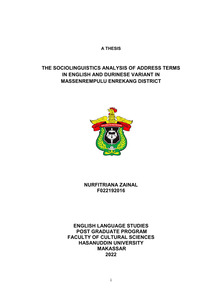Zainal, Nurfitriana (2022) THE SOCIOLINGUISTICS ANALYSIS OF ADDRESS TERMS IN ENGLISH AND DURINESE VARIANT IN MASSENREMPULU ENREKANG DISTRICT. Thesis thesis, Universitas Hasanuddin.
![[thumbnail of Cover]](/14049/1.hassmallThumbnailVersion/F022192016%20cover.png)

F022192016 cover.png
Download (161kB) | Preview
F022192016 1-2.pdf
Download (1MB)
F022192016 dp.pdf
Download (199kB)
F022192016.pdf
Restricted to Repository staff only
Download (2MB)
Abstract (Abstrak)
This research aims at. (1)identifying the types of the address terms used, and (2) analyzing the social aspects affecting the uses of the address terms 1n Engl sh and Enrekang Durinese based on dai y conversations
The research used the qualitative descriptive method The qualitative method as research procedure produced the descriptive data 1nvotving the spoken and written data from people and behavior which could be observed There were two types of data 1n this research, primary and secondary data The primary data were English and Enrekang Durinese daily conversations Enrekang Durinese data were taken using the field research observation, and recordings of everyday utterances The English data were obta1ried from the Movie and Senes conta1n1ng the utterances of the address terms. The secondary data were taken from the literature review and English v1deo/Vlog.
The research result Indicates the types of the address terms used 1n English and Enrekang Durinese in the daily conversations are: 1) pronoun (second-person pronoun), 2) kinship terms, and 3) non-kinship 1erms The difference of both languages are found in the pronouns, Enrekang Durinese has two types of second-person pronouns·polite and 1mpolrte, while English has only one second-person pronoun you The other differences are found 1n the k1nsh1p and non-kinship terms. Enrekang Dunnese people usually use mockery terms to address family and relatives, while using mockery terms to address family and relatives is not found in English data. Another result found in this research is that there are social aspects influencing the uses of the address terms 1n English and Enrekang Dunnese, they are 1) sex and age 2) situation. 3) social rank/social status, and 4) solidarity/intimacy
Keywords : Sociolinguistics, Address terms, Qualitative-descriptive method
| Item Type: | Thesis (Thesis) |
|---|---|
| Subjects: | P Language and Literature > PR English literature |
| Depositing User: | S.Sos Rasman - |
| Date Deposited: | 10 Mar 2022 01:27 |
| Last Modified: | 10 Mar 2022 01:27 |
| URI: | http://repository.unhas.ac.id:443/id/eprint/14049 |


